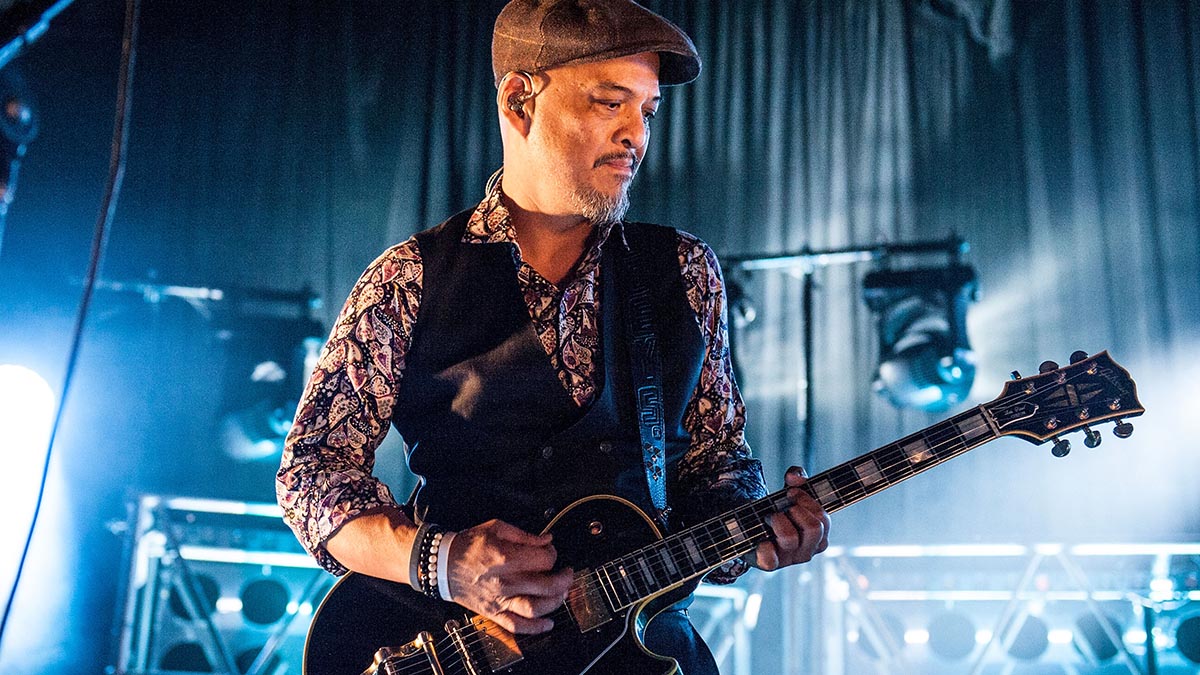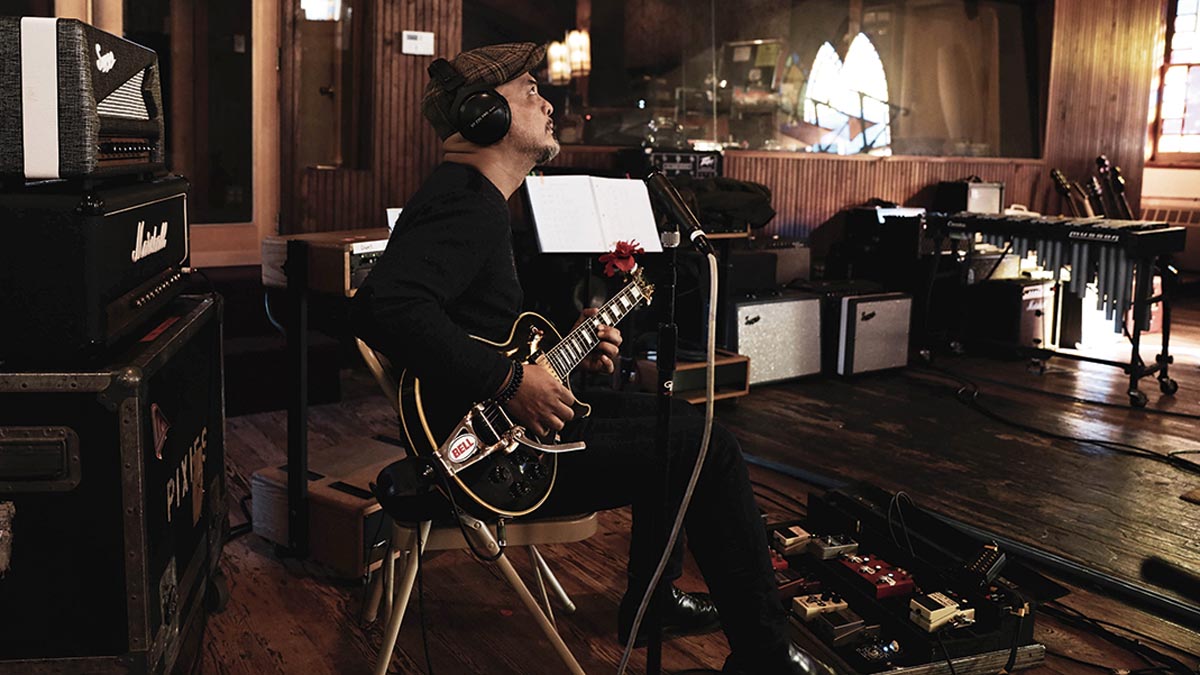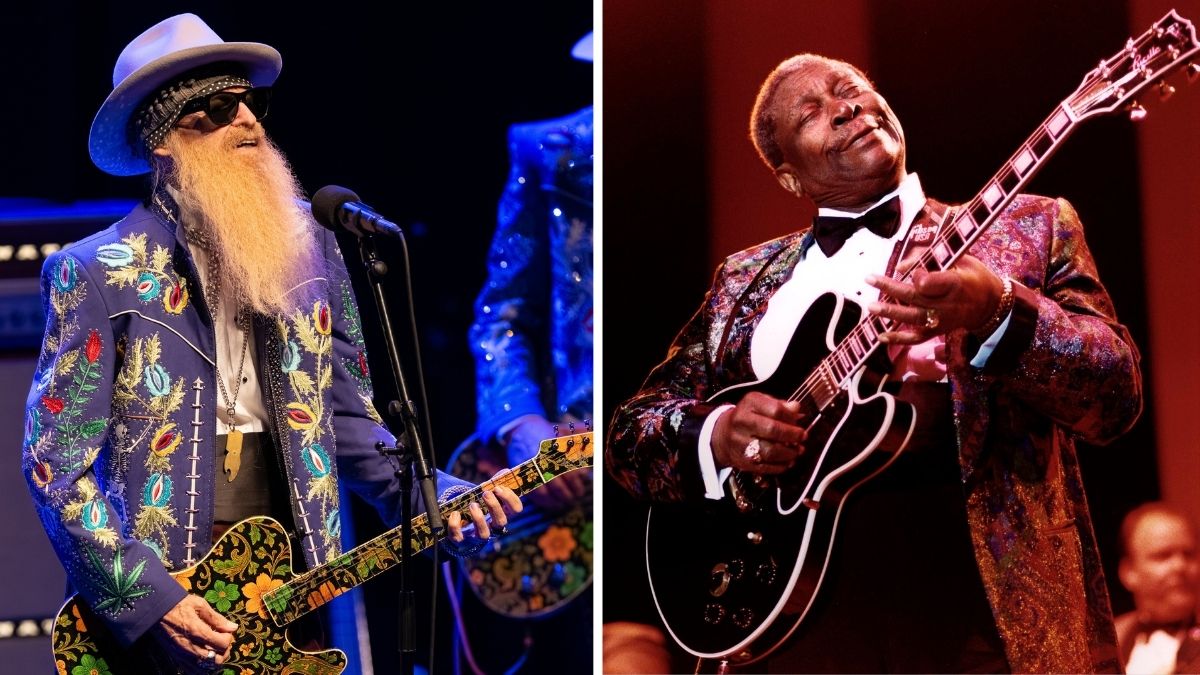Joey Santiago: “The non-traditional sounds I get are just the way I attack the guitar. When we play Vamos, I’ll hit my amps, bite my strings – I just go bananas”
The Pixies guitarist reflects on a career that shaped the direction of alt-rock, and a playing style inspired by the most primitive tools in the toolbox

All the latest guitar news, interviews, lessons, reviews, deals and more, direct to your inbox!
You are now subscribed
Your newsletter sign-up was successful
He’s the square-peg radical of alt-rock, whose angle‑grinder guitar parts made the Pixies the biggest cult band of the late ’80s.
As the Boston band releases a deluxe boxset of its fabled 2004 reunion shows at Brixton Academy, Joey Santiago tells us about military coups, celebrity fans and refusing to turn down.
Coming to America
“I was born in the Philippines, and if I’d stayed there, I probably would have joined the fucking guerillas, raised a coup, overthrown the government. We already had The Beatles, but if my family hadn’t emigrated to the US in 1972, maybe my musical choices wouldn’t have been so rock ’n’ roll.
“I remember taping radio shows, especially the comedy hour. But I get bored easily and after a while, I started thinking, ‘There’s gotta be more than this.’ And there was. There was tons of music out there.”
Snake Bite
“My first guitar was an Ovation Viper that my mother bought for me. It was a good guitar and I wish I still had it. But I remember, I broke up with someone just a little too early before getting my guitar out of there.
“I was influenced by players like Jimi Hendrix and George Harrison, Even Chet Atkins and Wes Montgomery. Maybe a little of their spirit is in my playing here and there. I don’t know how, but it’ll find its way in there. Les Paul, I like, too. He’s crazy. Like, the song The World Is Waiting For The Sunrise. I love it. It’s so good.”
College Rock
“I have great memories of going to college and meeting Charles [Thompson, aka Pixies frontman Black Francis]. I was just relieved I wasn’t among jocks. I was afraid of that when I went to college. I just didn’t want it to be, like, ‘bro’, ‘bro’, ‘bro’. There were eight of us and we were all eclectic, geeky nerds. That’s what I wanted. And I wanted to be the coolest one. I could tell immediately that Charles had something.”
All the latest guitar news, interviews, lessons, reviews, deals and more, direct to your inbox!
Choose Your Weapon
“Charles gave me the choice of playing lead guitar or bass. But I wasn’t gonna play bass. When Kim Deal [bass] joined the Pixies, she was definitely the coolest one among us. She’s just got this other thing going on. And a great bass player, always locked in with David [Lovering, drums]. She played like a bass player. You know when a guitarist is playing bass? You can tell. It’s not good. But she just locked into it.”

Tools of the Trade
“Charles is a really good rhythm player. Really exceptionally fucking good. My role is that I’m trying to refuse to play chords with him. Sometimes I have to, which is fine – you gotta start the song off – but I like it best when I veer off, like, ‘Where the hell did he go?’ And then I come back in. It’s just one of those things that works.
“I’m not the most proficient guitar player out there, but I’ve got a hammer, I’ve got a screwdriver and some duct tape. I think you can build almost anything from there. You can fix anything with those three tools. You just have to use them differently every time.”
Circuit Breakers
“I remember, the Pixies played a few songs in the college common room. I think we already had The Holiday Song, and I already had the mandolin-trilling and the string-bending stuff going on. When we started playing around Boston, people seemed to get it, right away.
“Our first gig ever was nerve-racking. We played to not many people – I think it was a Tuesday night – but the crowd really liked it. I thought maybe they were just saying that. Y’know, they were my brothers and my friends, so what the hell else were they going to say? But they kept coming back!”
Dynamic Duo
“A lot of other bands did the quiet/loud dynamic, too, so giving us all the credit is kinda silly. But we really exploited it. Also, we were heavily influenced by The Cars, and they chug a lot. When we discovered that chugging thing, it was like, ‘Holy fuck, this is really good.’ So you could really just chug it down then be quiet – and then just power in with another chord.
“Volume-wise, we were really, really loud. Even in those club days, Charles and I were those guitar players where the promoter was like, ‘You gotta turn down.’ And it was like, ‘No, don’t be silly.’ We’d turn down for the soundcheck, but then we’d start turning it back up. Then we figured out you could face the amps towards David, not towards the audience.”
Yin & Yang
“Frank uses Vox amps and I use the Marshall JCM800. He plays a Telecaster and I mostly play a ’57 Custom Reissue Les Paul. So it’s single-coil pickups and then humbuckers – the perfect combination. If I would have got a Tele, too, aesthetically, we would have looked like a country band. It just wouldn’t have been right.”
Less is More
“The only scales I really know are the blues, major and minor. But that’s all you really need to know, right? I arpeggiate a lot and I have my favourite stuff I like to do. But scale-wise… it’s important to know, but I don’t do it. I’ll go with my favourite four or five notes and that’s all I use. And sometimes, you only need one.
“I describe my guitar style as ‘angular and bent’. That’s the kind of shape I’m looking for on a guitar. Because I know what a blues scale looks like: it’s boxy and square, and you’re gonna sound like that. Y’know, you’re gonna sound boxed-in. I’m looking for things that have that chord in there. Y’know, the Jimi Hendrix chord. I don’t even know what you call that!”
Surf’s Up
“I get why people like the Surfer Rosa [1988] and Doolittle [1989] records so much. Maybe it’s because we were performing those songs for so long before we recorded them. Here Comes Your Man was Charles’ old riff that he had down on his piano a long time ago.
“That surfy sound we got was overdubbed with a lot of guitars. There was a Jazzmaster, a Tele, anything with single-coil pickups; I don’t think my Les Paul made it on there. I don’t know how the Debaser riff came about, but I forgot how to play it at one show in Japan. I had such a massive jetlag.
“Charles thought I was kidding around. But it was like, ‘I just can’t do it, I totally forgot!’ My own favourite guitar moments? I like the riff on the second chorus of U-Mass. And I like Is She Weird. It’s just so weird and clean-sounding, which I hardly ever get to do.”
More Taste, Less Speed
“I think a good guitar lick is something that you can hum, just something catchy and original. I’ll leave the Van Halen school of guitar playing to them. Technicians make me feel like shit. Like, ‘Why are you doing this to me?’ But not any more because I know where I am and I know what I have to do.
“But yeah, they’re impressive. Kudos to the technicians. You gotta respect them. But you gotta give them space, leave them alone. The job of any musician or artist is to be different, to offer something new.”
Outer Limits
“I have a DOD FX-17 wah that’s very modern-sounding, and I get a crazy sound from my Moogerfooger pedal, too. But I think the non-traditional sounds I get are maybe just the way I attack the guitar. When we play Vamos live, I’ll hit my amps, bite my strings – I just go bananas.
“On the other songs, it’s almost like the real me, very reserved. I’m a different person on Vamos. I remember, my Les Paul broke at the Zenith in Paris. It slammed down and it kept feeding back. So I put it on the stand and had a literal interpretation of a guitar solo, where the guitar is really by itself…”
High Praise
“It felt good to be endorsed by Kurt Cobain, but I could live forever knowing that David Bowie loved us – everything else is really just gravy. We did have bad reviews, too, though. Indie Cindy [2014] got really slammed.
“On the reviews for Bossanova [1990], I remember someone saying my playing was really elementary. And it was like, ‘Yeah, you caught me.’ It was, on some songs. So with Trompe Le Monde [1991], I came back and started doing hammer-ons, just because I was really sensitive and didn’t want that reviewer saying anything else about me.”
Live & Dangerous
“Whenever the Pixies record a song in the studio, we’re very concerned about: ‘Can we actually play this live?’ I don’t change how I play my riffs and solos live because I’m a music fan and when I go see bands, I want to hear it just like the album. For me, I don’t want any bullshitting around. I want it no-nonsense, just like the way it was.
“But the way we attack the songs is always different. Every show you do live, none of them are the same. Otherwise, it’d be too robotic. I’ll hit a note a little softer here and there, and I’ll hear Charles phrasing a little different. Just different enough to be cool, y’know?”
The Price of Fame
“The Pixies was great at the beginning, with Surfer Rosa and Doolittle. And then, Bossanova was all right. But it came to a time when people in the band, for some reason, weren’t happy. I don’t think it was about the success so much as it was about people being tense, not having a good time. There was stuff we should have said. We just kept dusting it under the carpet until the carpet got turned into a mountain.”
New Start
“The period after the Pixies split in 1993 was hard. I had to find something else to do. Charles had me play on a few of his records. Then I started composing for films. It’s a very different discipline. It’s scary, like, ‘What am I going to put on top of this?’ What happens is, you meet the producer and director, and they already have a sound they want.
“It’s like, ‘Do it like this [film], very close to being sued.’ Then I sit there watching the footage with a guitar in my hands, basically. Then I’ll cry or take a nap from the stress. I prefer making tense film music. But I did a comedy with Judd Apatow, too, called Undeclared. That was fun, like these little mini rock songs.”
The Bright Side
“I have to look at the silver lining of lockdown, right? I’m in LA. The traffic was great. I have a cat. I just played a lot of acoustic, mostly just strumming, which I love. I was sat on the couch at Norman’s Rare Guitars, with a bunch of acoustics all around me, ready to drop, like, $18,000 or something.
“I was gonna get a Martin D-28 or a D-14. But in the end, I got another Martin, this little guy, a ’50s 0-18. I fell in love with this guitar. It was like, ‘Man, this is the one – and it’s somehow less than I wanted to spend.’ It’s all mahogany, sounds great, should record well.
“A lot of Pixies songs start off on acoustic and I want to do that more. It makes it easier for me, first of all. I don’t have to compete with another distorted guitar.”
Next Chapter
“We’re going to Vermont to record a new Pixies album in January. I know I’m excited because I get very nervous. But this time around, I’m trying to have a different mindset. It’s just like, relax and don’t be too hard on yourself. It doesn’t have to be that painful. I’m just gonna wing it!”
- Live In Brixton is out now on Demon/Edsel.
Henry Yates is a freelance journalist who has written about music for titles including The Guardian, Telegraph, NME, Classic Rock, Guitarist, Total Guitar and Metal Hammer. He is the author of Walter Trout's official biography, Rescued From Reality, a talking head on Times Radio and an interviewer who has spoken to Brian May, Jimmy Page, Ozzy Osbourne, Ronnie Wood, Dave Grohl and many more. As a guitarist with three decades' experience, he mostly plays a Fender Telecaster and Gibson Les Paul.

